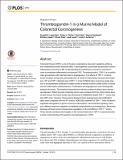| dc.contributor.author | Lopez-Dee, Zenaida P. | en_US |
| dc.contributor.author | Chittur, Sridar V. | en_US |
| dc.contributor.author | Patel, Hiral | en_US |
| dc.contributor.author | Chinikaylo, Aleona | en_US |
| dc.contributor.author | Lippert, Brittany | en_US |
| dc.contributor.author | Patel, Bhumi | en_US |
| dc.contributor.author | Lawler, Jack | en_US |
| dc.contributor.author | Gutierrez, Linda S. | en_US |
| dc.date.accessioned | 2015-11-03T15:58:19Z | |
| dc.date.issued | 2015 | en_US |
| dc.identifier.citation | Lopez-Dee, Zenaida P., Sridar V. Chittur, Hiral Patel, Aleona Chinikaylo, Brittany Lippert, Bhumi Patel, Jack Lawler, and Linda S. Gutierrez. 2015. “Thrombospondin-1 in a Murine Model of Colorectal Carcinogenesis.” PLoS ONE 10 (10): e0139918. doi:10.1371/journal.pone.0139918. http://dx.doi.org/10.1371/journal.pone.0139918. | en |
| dc.identifier.issn | 1932-6203 | en |
| dc.identifier.uri | http://nrs.harvard.edu/urn-3:HUL.InstRepos:23474012 | |
| dc.description.abstract | Colorectal Cancer (CRC) is one of the late complications observed in patients suffering from inflammatory bowel diseases (IBD). Carcinogenesis is promoted by persistent chronic inflammation occurring in IBD. Understanding the mechanisms involved is essential in order to ameliorate inflammation and prevent CRC. Thrombospondin 1 (TSP-1) is a multidomain glycoprotein with important roles in angiogenesis. The effects of TSP-1 in colonic tumor formation and growth were analyzed in a model of inflammation-induced carcinogenesis. WT and TSP-1 deficient mice (TSP-1-/-) of the C57BL/6 strain received a single injection of azoxymethane (AOM) and multiple cycles of dextran sodium sulfate (DSS) to induce chronic inflammation-related cancers. Proliferation and angiogenesis were histologically analyzed in tumors. The intestinal transcriptome was also analyzed using a gene microarray approach. When the area containing tumors was compared with the entire colonic area of each mouse, the tumor burden was decreased in AOM/DSS-treated TSP-1-/- versus wild type (WT) mice. However, these lesions displayed more angiogenesis and proliferation rates when compared with the WT tumors. AOM-DSS treatment of TSP-1-/- mice resulted in significant deregulation of genes involved in transcription, canonical Wnt signaling, transport, defense response, regulation of epithelial cell proliferation and metabolism. Microarray analyses of these tumors showed down-regulation of 18 microRNAs in TSP-1-/- tumors. These results contribute new insights on the controversial role of TSP-1 in cancer and offer a better understanding of the genetics and pathogenesis of CRC. | en |
| dc.language.iso | en_US | en |
| dc.publisher | Public Library of Science | en |
| dc.relation.isversionof | doi:10.1371/journal.pone.0139918 | en |
| dc.relation.hasversion | http://www.ncbi.nlm.nih.gov/pmc/articles/PMC4603676/pdf/ | en |
| dash.license | LAA | en_US |
| dc.title | Thrombospondin-1 in a Murine Model of Colorectal Carcinogenesis | en |
| dc.type | Journal Article | en_US |
| dc.description.version | Version of Record | en |
| dc.relation.journal | PLoS ONE | en |
| dash.depositing.author | Lawler, Jack | en_US |
| dc.date.available | 2015-11-03T15:58:19Z | |
| dc.identifier.doi | 10.1371/journal.pone.0139918 | * |
| dash.authorsordered | false | |
| dash.contributor.affiliated | Lawler, Jack | |


